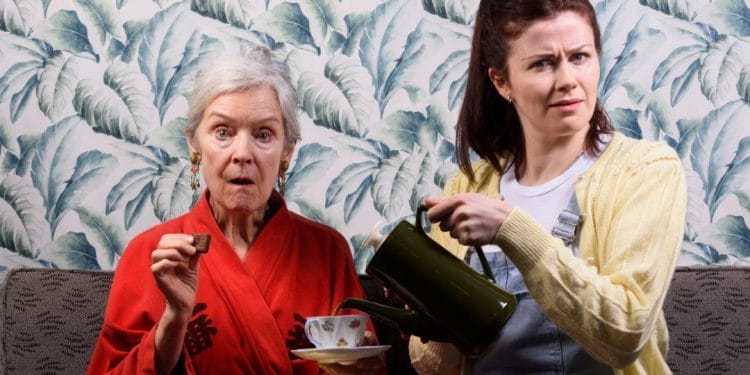Following sell-out runs at the Camden Fringe and Edinburgh Fringe 2017, where it won the Lustrum Award for Outstanding Play, the heart-warming Cockamamy comes to The Hope Theatre this summer. This razor-sharp play examines companionship and the reality of living with dementia.
Focusing on the experiences of two strong women and a family powerless against disease, this play uses the comedy that arises from tragedy to sensitively portray the struggles families around the world face, with one in six people expected to develop dementia according to The Alzheimer’s Society.
We spoke to writer and performer, Louise Coulthard to find out more.
Cockamamy is at The Hope Theatre 12th – 30th June 2018.
Your play, Cockamamy is coming to The Hope Theatre, what can you tell us about it?
It’s a raw, funny, heartbreaking tale of companionship. I wrote it while caring for Alice, my grandmother, who had dementia. It struck me that a lot of art and literature responds to the heartache that this disease brings, however, living through it, I discovered there were so many joyful moments that Gran and I were sharing. That’s where I began when writing the play.
Cockamamy stars Mary Rutherford, who is absolutely brilliant. I was fortunate enough to live with Mary for a short while and we’ve been friends for many years, so share a great chemistry which (I hope) is reflected onstage! We previewed Cockamamy at the Camden Fringe in 2016 to great acclaim, which allowed us to take the play to Summerhall, Edinburgh Fringe in 2017 where we won The Lustrum Award for Outstanding New Play.
Above all it’s a down to earth story about family and what it is to love and be lost.
How does it feel performing in a play you’ve written?
It’s a pleasure. It is such a personal piece and one which means a great deal to me. I was working in a pub pulling pints when I wrote it and always thought my target audience should be the locals. Dementia touches so many lives and so it was essential for me that Cockamamy was aimed at real people. I’m thrilled that the play seemingly attracts people from all walks of life and feel quite honoured to share it with them.
Performing your own work, however, doesn’t come without its complications. On the one hand, I know the material through and through, I own it, I have a deep understanding of it and I love the freedom that that brings to my performance. On the other hand, that deep understanding can also be a hindrance and not feel very freeing at all. It can be difficult to approach playing the piece with a fresh pair of eyes, to play the character with new, different intentions than the ones I originally intended when writing it. It was vitally important to have an outside approach and our brilliant director, Rebecca Loudon is excellent at analysing the script and challenging my performance of it.
Was it difficult describing your own personal experience of dementia with a family member?
It had been bubbling away for a long time. I was so full of pain, joy, frustration, guilt, laughter and, sat in a pub one day, it poured out onto the back of a receipt. I scribbled down my feelings, things my Gran had said, the memories we’d built together, and soon enough I had an outline for a play. My Gran died as I was halfway through writing the script and that was really difficult as, in hindsight, that’s when it truly got personal. I began writing the version of the play I wanted for her, a dignified and happy end, which was neither true or fair on an audience. Rebecca and I worked together to help me separate my grief from the story and the play is all the better for it.
What’s been the most challenging aspect to get across onstage?
Dementia is a degenerative disease and our play is set over several years. To help illustrate this we have a lot of props – including 60 tins of SPAM – and some quick costume changes, which have proven to be VERY hectic in the past. Luckily our run in Edinburgh (with a 15minute ‘get in’ and little room backstage) means we all know the show inside out and back to front.
Have you changed much since the Edinburgh run?
The play has had a lot of time to settle in our minds and now we have this clearer understanding of what is required. It’s a rare but great luxury to have so much time to reflect on a character before performing them again and hopefully that will mean we hit the ground running at rehearsals later this month. As a writer, the time has also allowed me the time to contemplate the script and make some developments. The most exciting change is that we now have a fantastic full, professional team who are dedicated to making the play the best it can be.
What would you say to anyone thinking of coming to see Cockamamy?
Come and see it! You’ll hopefully laugh, you might cry and you’ll probably learn something new. If you’ve ever loved or lost then this is the play for you.
















